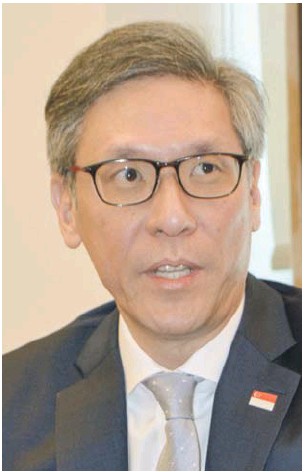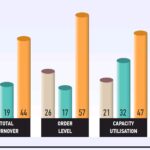“Singapore was the most competitive economy in 2019, according to the World Economic Forum, ranked second in the World Bank’s list of most convenient for businesses transactions. It ranked first in the Global Competitiveness Index in Asia and second across the world in 2019.” This is how Singapore Ambassador Jonathan Tow describes the country he’s representing here in Turkey. Situated as one of the largest wealth funds in Turkey, the Singapore Wealth Fund is working on new reciprocal investments and acquisitions in Turkey, according to the Ambassador.
Tow argues that the business opportunities presented by the recent Free Trade Agreement (FTA) are generally overlooked. “In fact, the FTA presents various business opportunities to both countries. For example, this agreement opens the doors of South Asia to the Turkish business world through Singapore.”
The surplus of USD 1bn-worth of bilateral trade is advantageous for Turkey, Tow says. Through the FTA, Turkish products find their way into the region without any tariffs. In addition to the export of goods, this advantage is also accorded to services, he added. The FTA is the most modern and comprehensive deal that Turkey has signed with any country with various sectors involved, according to the Ambassador.
In e-commerce, Turkey is an important actor in Singapore, China, India and Indonesia. Tow believes the Turkish business world could also utilize its position to its advantage. “Nowadays, exports are mainly done through e-commerce. Singaporean companies have access to decent networks across these markets and Turkey is not really familiar to them. In this context, Singaporean companies can aid Turkish companies to be present in these markets,” he said.
Singapore is not a big country but since it is an important e-commerce hub and intellectual property and financial services center, it can carry Turkey further to the top, according to the Ambassador. In addition, the country helps Turkish companies take part in public biddings in Singapore.
Free trade agreement opens the doors o South Asia to Turkish businesses, Jonathan Tow, Singapore Ambassador in Ankara, says.
SIGNIFICANT INVESTMENTS IN TURKEY
The Singapore Wealth Fund is very much active in Turkey. Asked for concrete evidence of the activities of the fund, including investments, the Ambassador said Fund representatives hold significant meetings in Turkey. Various Singaporean companies invest in Turkey through the fund, he added. For example, one of the main actors in the global port sector, PSA International Pte Ltd, invested in the Mersin International Port in 2007. Through this investment, the company acquired 51 percent of the port and now manages operations there as well.
In other areas, the global integrated supply chain manager and processor of agricultural goods and food components, Olam International, acquired Progida Group in 2011. The company is the second largest hazelnut manufacturer in Turkey. The owner of Ascott, Somerset, Quest, Crest Collection and Citadines, Ascott Holdings operates Somerset Maslak Istanbul. The company aims to launch more projects in Istanbul in 2020.
SINGAPORE CAN BECOME TURKEY’S ENTRANCE TO SOUTH ASIA
The Embassy has been conducting meetings with techno parks, chambers of trade and start-ups in Turkey to increase bilateral trade between the two countries. Meeting with 10 different chambers of commerce, the Ambassador observed that they are not aware of the opportunities yet. In order to increase awareness, the Embassy hosted officials from Singapore this past year to get them talking about business opportunities, advantages and applications in Singapore with the Turkish business world. In November 2019, Turkish companies attended SWITCH at the Singapore Fintech Festival.
Also, textile and construction companies from Bursa visited Singapore in October 2019 and gained a perspective on potential partnerships and opportunities. Twenty-two food companies from Izmir visited Singapore in December 2019 to see the business opportunities for themselves. Tow believes more trade committee visits can be arranged.
On the other hand, according to the Asian Development Bank, the infrastructure needs of developing countries in the region will surpass $26 trillion by 2030. “When the energetic ecosystem of Singapore, which includes opportunities for smart and sustainable infrastructure projects and Singapore’s role as a finance center, are considered, Singapore can act as an entrance to South Asia for Turkish companies to make infrastructure investments,” Tow concluded.










